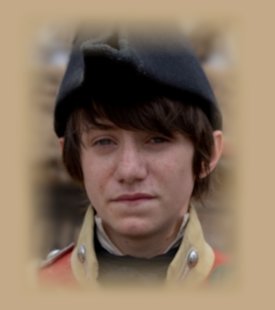Post by Timothy Howard on Jul 7, 2014 18:45:55 GMT
Name:
Brigadier General Timothy Howard
Age:
38
Patriot
Physical Appearance:
Not a terribly imposing man, roughly 5'8 in height with a thin, athletic build. Typically clean shaven and well groomed, his curly black hair shows some signs of early balding. The man almost never smiles, his pale green eyes usually serious and somber. His uniform is always well pressed and clean, and he appears the epitome of southern gentleman.
Strengths: Extremely intelligent, very experienced in combat tactics and overall strategy, honorable soldier, highly adaptable, understands siege warfare. He also has no qualms with grabbing a pickaxe and digging with the soldiers themselves, and will often pass up a meal to ensure his men eat instead. A good head for mathematical figures.
Weaknesses: A bit of a booze hound, believes himself better than he actually is, an unflinching and uncompromising disciplinarian, gets frustrated by American lack of discipline and distrusts militias. Doesn't really see the merit in provisional rifle companies.
Background:
Born in Cardiff, Wales in 1737, he was the first born and only son of four children to Daniel and Elizabeth Howard. The son of a factory owner, he showed great promise in school from a very young age and when he became of age he attended the Royal Military Academy at Woolwich to become an artillery officer. Graduating in 1757 at the age of 20, he was then thrust into the North American theater of the Seven Years War currently raging throughout Europe. There, he experienced the severe disappointment of defeat as his very first battle was the failed siege of Louisbourg. There he gained first hand experience and crucial understanding of the importance of artillery, and would later participate in the 2nd Siege of Louisbourg and the Siege of Montreal with his guns playing a pivotal role in the fall of the cities. He was then transferred to the 13 colonies, where he helped militia and regular forces put down Pontiac's Rebellion.
After the war Timothy felt he had done his duty and had enough of war. Not wanting to return to Great Britain, he moved to Charles Towne, South Carolina, and established what would become a rather successful shipping business. In time he would marry the beautiful Cassandra Porter, raise a family of his own (two daughters and a son), and begin to feel a strong connection towards the colonies more than he ever felt with England. As revolutionary fervor broke out, he tried his best to stay as far and away from the hoopla as possible until he found his wife and her family harbored patriot sympathies. When the war began, Timothy initially thought he'd simply use his shipping business to help run supplies from places such as Cuba, or New Orleans. Instead, a few representatives of South Carolina, Georgia, and North Carolina approached him and asked him to help lead the new Continental Regulars from the South and aid the New England colonies, who were bearing the brunt of the British Forces. At the insistence of his wife he agreed, and took the commission as a Brigadier General to be in charge of the Southern Brigade. While initially only consisting of three infantry regiments (2nd South Carolina, 1st Georgia, and 2nd North Carolina), as they marched north they were joined by the Continental Artillery Regiment, the 1st Virginia, and the Continental Light Dragoons.
Brigadier General Timothy Howard
Age:
38
Patriot
Physical Appearance:
Not a terribly imposing man, roughly 5'8 in height with a thin, athletic build. Typically clean shaven and well groomed, his curly black hair shows some signs of early balding. The man almost never smiles, his pale green eyes usually serious and somber. His uniform is always well pressed and clean, and he appears the epitome of southern gentleman.
Strengths: Extremely intelligent, very experienced in combat tactics and overall strategy, honorable soldier, highly adaptable, understands siege warfare. He also has no qualms with grabbing a pickaxe and digging with the soldiers themselves, and will often pass up a meal to ensure his men eat instead. A good head for mathematical figures.
Weaknesses: A bit of a booze hound, believes himself better than he actually is, an unflinching and uncompromising disciplinarian, gets frustrated by American lack of discipline and distrusts militias. Doesn't really see the merit in provisional rifle companies.
Background:
Born in Cardiff, Wales in 1737, he was the first born and only son of four children to Daniel and Elizabeth Howard. The son of a factory owner, he showed great promise in school from a very young age and when he became of age he attended the Royal Military Academy at Woolwich to become an artillery officer. Graduating in 1757 at the age of 20, he was then thrust into the North American theater of the Seven Years War currently raging throughout Europe. There, he experienced the severe disappointment of defeat as his very first battle was the failed siege of Louisbourg. There he gained first hand experience and crucial understanding of the importance of artillery, and would later participate in the 2nd Siege of Louisbourg and the Siege of Montreal with his guns playing a pivotal role in the fall of the cities. He was then transferred to the 13 colonies, where he helped militia and regular forces put down Pontiac's Rebellion.
After the war Timothy felt he had done his duty and had enough of war. Not wanting to return to Great Britain, he moved to Charles Towne, South Carolina, and established what would become a rather successful shipping business. In time he would marry the beautiful Cassandra Porter, raise a family of his own (two daughters and a son), and begin to feel a strong connection towards the colonies more than he ever felt with England. As revolutionary fervor broke out, he tried his best to stay as far and away from the hoopla as possible until he found his wife and her family harbored patriot sympathies. When the war began, Timothy initially thought he'd simply use his shipping business to help run supplies from places such as Cuba, or New Orleans. Instead, a few representatives of South Carolina, Georgia, and North Carolina approached him and asked him to help lead the new Continental Regulars from the South and aid the New England colonies, who were bearing the brunt of the British Forces. At the insistence of his wife he agreed, and took the commission as a Brigadier General to be in charge of the Southern Brigade. While initially only consisting of three infantry regiments (2nd South Carolina, 1st Georgia, and 2nd North Carolina), as they marched north they were joined by the Continental Artillery Regiment, the 1st Virginia, and the Continental Light Dragoons.









